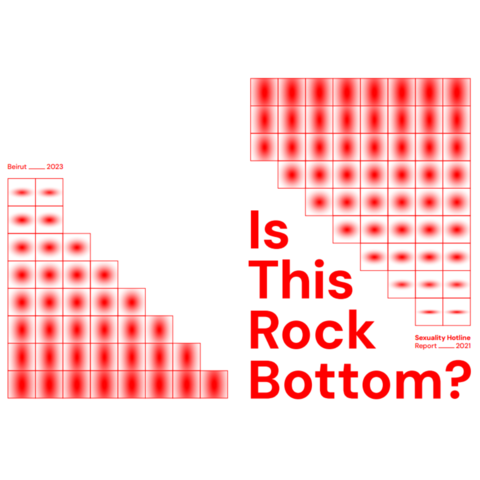IS THIS ROCK BOTTOM? Fifth Sexuality Hotline Report (Jan 2021-Dec 2021)
This publication is the fifth edition of the sexuality hotline report. It offers an in-depth analysis of the data collected from calls made to the sexuality hotline in 2021 and contextualizes the data to the interlayered crises that continued to unfold in Lebanon that same year.
When the time came for us to name and politically frame our 2021 report, we were stumped – the theme almost always presents itself to us. But this was not a year of theorizing; it was a year of doing and passing time while trying to stay functional, even though we need not be. So much has happened in 2021 that we found it inevitable to hit pause, slow down, and ask ourselves (with squinting scared eyes) is this rock bottom? This year’s report won’t have a theoretical framework, it will be just as we were that year; observing, attempting to patch-up grand wounds with a band-aid, reporting what happened, and waiting to see how the pieces continue to fall.
The first section is a spiraling contextualization and observation of the events that had occurred in 2021 in Lebanon, largely focused on the impact of the economic crisis on the availability of food, medication, and gasoline. This segment paints a rough image of the context in which many callers and counsellors were living through as they sought support and the lending of support on matters of sexual and reproductive health and rights.
The second section focuses on presenting experiences of crises from the perspective of hotline callers. Within this section you will find demographic information, such as the age, gender, location, and nationality of callers, as well as their relationship to the hotline, and their take on the crises as analysed through the quantitative and qualitative data collected from the sexuality hotline calls. This section also offers a breakdown of hotline call topics with an emphasis placed on the most popular topics discussed this year, and the new topics that emerged in response to the deteriorating living conditions in Lebanon. Topics were analysed under a method of coding that involved parent and child code processes.
The final section of the report looks into counsellors’ perspectives on the year, focusing on their relationship to the hotline, the callers, and their roles as counsellors during the crisis. For the first time we gain counsellor insights by zooming out of their post-call reflections and holding space for a focus group discussion where they paint a big picture analysis on the behind-the-scenes events of the hotline.
